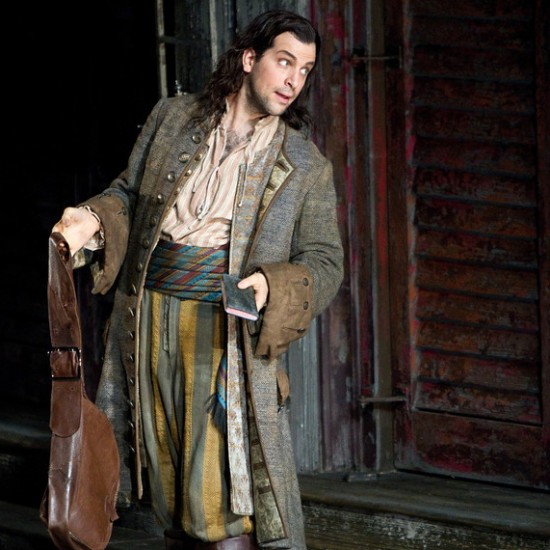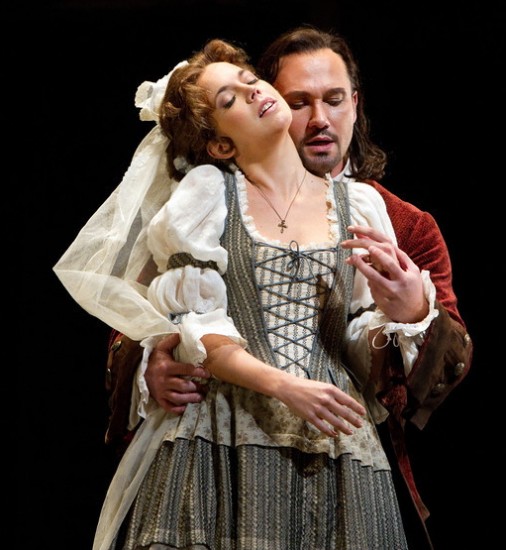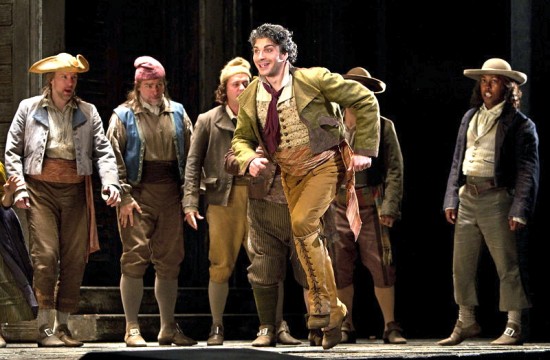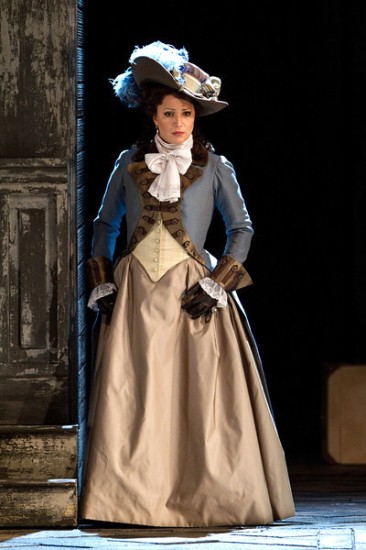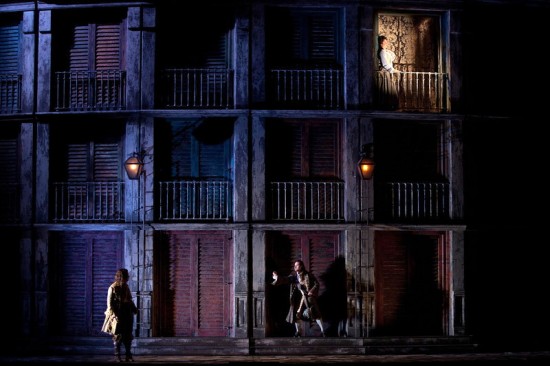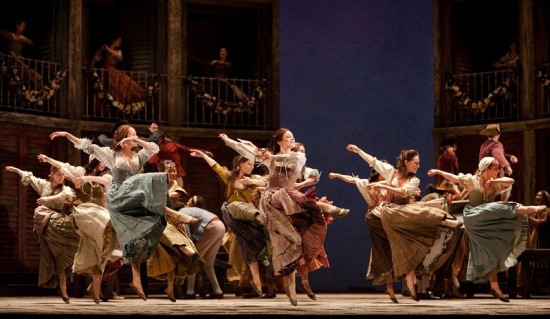The advance program said that James Levine would be the conductor. The program at the theater door listed Fabio Luisi as the conductor. At intermission, Ren�e Fleming interviewed Maestro Luisi and we found out that he was the Met’s new Principal Conductor. Obviously there was a story here.
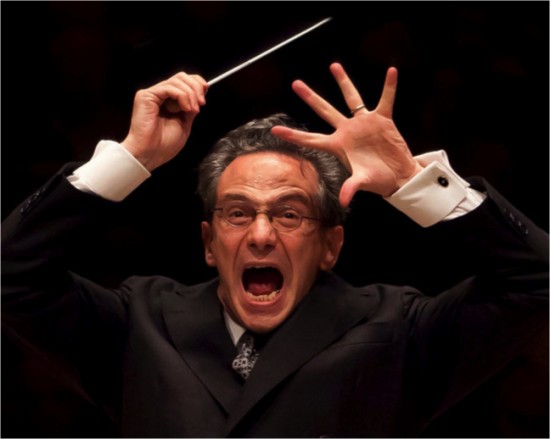
Fabio Luisi, new principal conductor at the Metropolitan Opera; photo by Richard Termine for The New York Times
Strangely, I was unable to find that story anywhere on the Met’s website, but I finally did a google search and found it in New York Times’ articles dated September 7 and 22, 2011. Levine had a fall while vacationing in Vermont and reinjured his back forcing him to cancel all performances at least for the fall season. The Met immediately promoted Luisi from Principal Guest Conductor to Principal Conductor; Levine remains Music Director. Peter Gelb, General Manager of the Met said, “My hope is that he will be back. He hopes he will be back. There is nothing he wants more to do than conduct the Metropolitan Opera.”

Best wishes for a speedy recovery, Jimmy.
On to Don Giovanni. I know the first question you are going to ask: “How did this production compare with the SF Opera production you saw on October 18, 2011 – just eleven days ago?”
I can’t answer that question. Sorry, but I’m not qualified to throw around those erudite words to compare the voice quality of singers. To my ear both casts were filled with excellent singers in all of the roles. But if I rephrase your question: “How did you enjoy this production compared with the SF Opera one?”, then I can start talking.
Over-all, I can’t remember a production of Don Giovanni that I have enjoyed more than this one as seen on HD. That last phrase is important. I don’t believe I would have said the same thing had I been seeing it in Lincoln Center. Don Giovanni is basically an intimate opera. There are only 8 characters and seeing those characters up close adds tremendously to my enjoyment. For more than half of the characters their facial expressions and body language were perfect fits for the character they were playing.
Start with Mariusz Kwiecien in the role of Don Giovanni. In repose or in action he could be the embodiment of the fa�ade he presented to the world: urbane, courtly, sincere – no wonder the women fell for him. But every once in a while he would drop the mask and instantaneously show his true character: ego-centric, cruel, psychopathic.
Luca Pisaroni’s Leporello is more complex. In fact, I don’t think we ever know what he is really like, deep down inside. At times he is brave, cowardly, clever, philosophical – all qualities necessary to survive as a servant of Giovanni. He deplores the Don’s lifestyle, but envies his success with women. At times he achieves a look of admiration for Giovanni when he is abetting him in the details of one of his seduction plots.
Mojca Erdmann won my heart with her portrayal of the peasant bride Zerlina. Lovely to look at with a face that showed you exactly what she was thinking and feeling. Particularly when Giovanni was sweeping her off her feet during their first scene together. “I know I shouldn’t, but it is so exciting.” “Can I believe him? – I want to very much, but can I?” “Can this be happening to ME?” You didn’t need to understand Italian or to read the subtitles. Her expression told you everything.
Masetto is usually played as a simple country bumpkin, but Joshua Bloom gave a depth to the character that I hadn’t thought about before. When Giovanni threatens him with his superior rank and force, Masetto bows away, saying, “I understand you sir,” as any prudent person would do. However, he somehow manages to convey the message that, “I recognize your physical power, sir, but I’m not conceding you any moral right at all.” And he manages to stop just short of insolence – but only just.
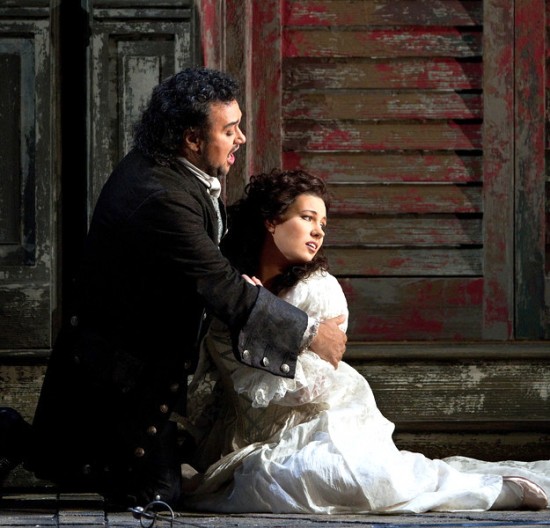
Marina Rebeka’s Donna Anna is a real problem to evaluate. At first glance she shows little variety of emotion and I compare her acting ability unfavorable with Mojca Erdmann’s Zerlina. But then I realize that Donna Anna is a weak character with little emotional range so that, in point of fact, Rebeka is playing her perfectly!

I don’t know what to say about Don Ottavio. Ram�n Vargas has a phenomenal voice and it blended beautifully with that of Marina Rebeka when they sang their duets. And, as I’ve said before, Mozart has given the two of them some of the best music in all opera. But Don Ottavio is an essentially weak character, and both the face and the stance of Ram�n Vargas suggest strength. He fails to convince me that he is, indeed, Don Ottavio.
In her interview with Ren�e Fleming during the intermission, Barbara Frittoli said that she visualized Donna Elvira as an older woman, probably a widow. Part of the reason she has such trouble overcoming her infatuation with Don Giovanni is she has no other possibility for a husband. It was an interesting interpretation and, at least for me, a novel one. Unfortunately, I found nothing in her actions to hint at that aspect of Elvira’s personality.
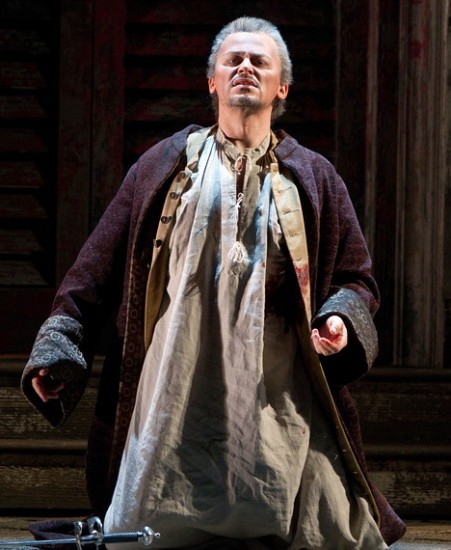
Štefan Koc�n completed the cast of eight, getting himself killed as The Commendatore early in the first scene and returning as his own statue for the last two scenes. He was very convincing as Anna’s father in scene 1 – of course as a stone statue he is supposed to be expressionless.
The production team (Production, Michael Grandage; Set & Costume Designer, Christopher Oram; Lighting Designer, Paule Constable) outdid themselves. The basic background was actually about halfway back in the vast Met stage. It consisted of 3 or 4 levels of about a dozen shuttered balconies each. The shutters could be open for an individual balcony as in the hilarious scene where Giovanni and Leporello trade outfits so that the Don could woo Anna’s maid.
Incidentally, in this scene Luca Pisaroni demonstrated a remarkable ability as a singer. He imparted a noticeably different quality to his voice when Leporello was pretending to be the Don than when he was giving an aside to the audience. Any decent actor can do this while speaking, but Pisaroni did it while singing!
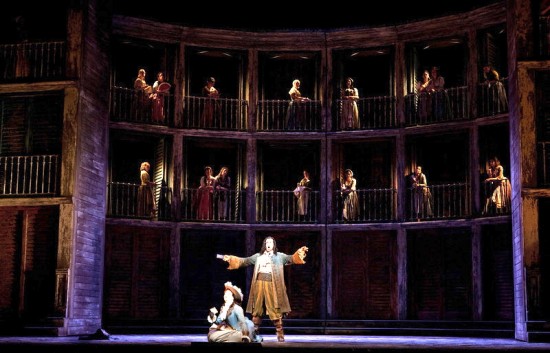
In the early scene where Leporello is telling Elvira of Don Giovanni’s multi-hundred amorous exploits, all the shutters are opened to show dozens of rooms with one or more female conquest in each.
When the script calls for a large interior space such as the ballroom in Don Giovanni’s castle, the whole back wall splits in the middle as is drawn back in emulation of a curtain. Too much technology can be distracting, but in this production it was all very effective.
As one might expect from the Met, the final scene was spectacular – flames shooting to the top of the stage, Štefan Koc�n as the statue intoning a bass, “Repent, repent,” Mariusz Kwiecien screaming as Don Giovanni sank down to Hell. Somehow there was an illusion that the entire stage was collapsing, but when the smoke cleared and the curtain started coming down, the banquet table and Leporello were still there – only Giovanni was missing. I wish that photographer Marty Sohl could have included a picture of that final scene for me to show you – but he didn’t, so you�ll have to come to the Encore on November 16 and see for yourself.
I wish more strongly the Met had made the same choice as San Francisco Opera did and ended the opera there. The curtain popped up again long before I was ready to stop applauding, and the other singers all rushed on stage for the joyful sextet. It’s lovely music, of course, but I was definitely not in the mood for it. Oh, well. You can’t win �em all.
Despite my minor cavils above, I’ll stick to my original assessment that, “Over-all, I can’t remember a production of Don Giovanni that I have enjoyed more than this one.”
I am definitely planning to go to the Encore on Wednesday November 16 at 6:30 pm (local time). Wherever you live, look up your nearest theater at metoperafamily.org and run, don’t walk to buy yourself a ticket.
The Opera Nut
Photos, except as noted: Marty Sohl/Metropolitan Opera
This review by Philip G Hodge appeared in sanfranciscosplash.com on November 2, 2011.


